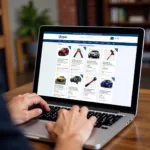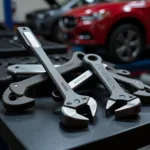Buying a car from a recycler can be a great way to save money, but it’s crucial to inspect the vehicle thoroughly before making a purchase. This involves using the right cars tools used for buy recycler inspections to ensure you’re getting a good deal and not a lemon. This guide will walk you through the essential tools and techniques to help you confidently assess a recycled vehicle.
Essential Tools for Inspecting Cars at a Recycler
When inspecting cars tools used for buy recycler lots, having the right equipment can reveal hidden problems and help you make an informed decision. Here’s a list of must-have tools:
- Code Reader: A code reader is essential for checking the car’s computer for stored diagnostic trouble codes (DTCs). These codes can indicate potential issues with the engine, transmission, or other systems.
- Multimeter: A multimeter helps you test the electrical system, including the battery, alternator, and starter.
- Tire Pressure Gauge: Check tire pressure for even wear and proper inflation. Uneven tire wear can be a sign of suspension or alignment problems.
- Flashlight: A powerful flashlight is crucial for inspecting dark areas like the engine compartment, undercarriage, and inside the trunk.
- Mechanic’s Stethoscope: This tool helps pinpoint the source of unusual noises coming from the engine, transmission, or other components.
- Inspection Mirror: Use a mirror to see hard-to-reach areas like the underside of the engine or the back of the transmission.
- Jack and Jack Stands: Safely lift the vehicle to inspect the undercarriage for rust, damage, and leaks. Never work under a car supported only by a jack.
- Gloves and Safety Glasses: Protect yourself from dirt, grease, and potential hazards.
Decoding the Inspection Process: A Step-by-Step Guide
Inspecting a recycled car can seem daunting, but breaking it down into manageable steps simplifies the process. Here’s a structured approach:
- Visual Inspection: Walk around the car and look for any signs of damage, rust, or mismatched paint. Check the panel gaps for consistency.
- Engine Compartment: Inspect the engine for leaks, corrosion, and worn belts or hoses. Check fluid levels (oil, coolant, brake fluid, power steering fluid).
- Interior Inspection: Check the condition of the seats, carpets, and dashboard. Look for signs of wear and tear, water damage, or mold.
- Test Drive: If possible, take the car for a test drive. Pay attention to how the engine runs, the transmission shifts, and the brakes feel. Listen for any unusual noises.
- Undercarriage Inspection: Use the jack and jack stands to safely lift the car and inspect the undercarriage. Look for rust, damage, and leaks.
Understanding Common Issues in Recycled Cars
Recycled cars, by nature, have a history. Being aware of common issues can help you identify potential problems during your inspection. These can include:
- Previous Accident Damage: Look for signs of prior repairs, such as mismatched paint or uneven panel gaps.
- Flood Damage: Check for water stains, mold, or a musty smell inside the car.
- Mechanical Problems: Use the diagnostic tools to check for engine, transmission, or electrical issues.
“When buying a recycled car, a thorough inspection is non-negotiable. Don’t hesitate to walk away if you have any doubts.” – John Davis, Automotive Expert
Why the Right Tools Make All the Difference
Using the correct cars tools used for buy recycler inspections is paramount to uncovering potential problems and ensuring a worthwhile purchase. These tools empower you to make informed decisions, potentially saving you from costly repairs down the line.
Conclusion
Buying a car from a recycler can be a smart move, but it’s vital to approach it with caution and the right tools. By using the cars tools used for buy recycler inspections outlined in this guide, you can increase your chances of finding a reliable vehicle at a great price. Remember, a thorough inspection is your best protection against buying a problem car.
FAQ
- What is the most important tool for inspecting a recycled car? A code reader is essential for diagnosing potential engine or transmission problems.
- Should I always take a recycled car for a test drive? Yes, a test drive is crucial to assess how the car performs on the road.
- What are some signs of flood damage in a car? Look for water stains, mold, or a musty smell inside the car.
- How can I check for previous accident damage? Inspect the car for mismatched paint, uneven panel gaps, or signs of prior repairs.
- Why is inspecting the undercarriage important? The undercarriage can reveal rust, damage, and leaks that may not be visible from above.
- Can I negotiate the price of a recycled car? Yes, negotiating is often possible, especially if you find any issues during the inspection.
- Where can I find more information about car inspection tools? DiagFixPro provides comprehensive reviews and information on various car diagnostic tools.
Need support? Contact us via WhatsApp: +1(641)206-8880, Email: [email protected] or visit us at 910 Cedar Lane, Chicago, IL 60605, USA. We offer 24/7 customer support.

